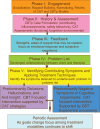A randomized controlled trial comparing cognitive behavior therapy, cognitive adaptation training, their combination and treatment as usual in chronic schizophrenia
- PMID: 25193976
- PMCID: PMC4393683
- DOI: 10.1093/schbul/sbu127
A randomized controlled trial comparing cognitive behavior therapy, cognitive adaptation training, their combination and treatment as usual in chronic schizophrenia
Abstract
Following baseline assessment, 166 patients in medication maintenance at a community mental health center who were experiencing both persistent positive symptoms of schizophrenia and impairments in functioning were randomized to 1 of 4 treatments for 9 months: (1) Cognitive Behavior Therapy for psychosis (CBTp)-a therapy designed to identify and alter reasoning and appraisal biases that contribute to the formation and maintenance of positive symptoms, (2) Cognitive Adaptation Training (CAT)-a treatment using environmental supports including signs, alarms, checklists and the organization of belongings established at weekly home visits to compensate for impairments in cognitive functioning and improve everyday functional outcomes, (3) Multi-modal Cognitive treatment-a combination of CBTp and CAT, and (4) Treatment as Usual. Data on symptoms and functional outcomes were obtained every 3 months. A mixed effects regression model with repeated measures using a 2 (CAT/no CAT) × 2 (CBT/no CBT) design indicated that functioning as measured by the Multnomah Community Ability Scale improved more in groups receiving CAT than other treatment groups. Auditory hallucinations and associated distress improved slightly more in groups receiving CAT. In this study, CBTp did not improve outcomes. Combining CAT with CBTp did not improve outcomes more than CAT alone.
© The Author 2014. Published by Oxford University Press on behalf of the Maryland Psychiatric Research Center. All rights reserved. For permissions, please email: journals.permissions@oup.com.
Figures
Comment in
-
Cognitive adaptation training demonstrated benefits for individuals living with schizophrenia in terms of community functioning and impact of auditory hallucinations.Aust Occup Ther J. 2015 Oct;62(5):367-8. doi: 10.1111/1440-1630.12231. Aust Occup Ther J. 2015. PMID: 26442872 No abstract available.
References
-
- Maples NJ, Miller AL, Evans L, et al. Translating evidence-based practices into community treatment settings. Schizophr Bull. 2007;33:595.
-
- Zimmermann G, Favrod J, Trieu VH, Pomini V. The effect of cognitive behavioral treatment on the positive symptoms of schizophrenia spectrum disorders: a meta-analysis. Schizophr Res. 2005;77:1–9. - PubMed
-
- Velligan DI, Turkington D, Tai S. Multi-modal cognitive therapy for schizophrenia: Addressing cognitive impairment and dysfunctional cognitive schemas. Schizophr Bull. 2009;35(suppl 1):345–346.
-
- O’Connor R, Herrman H. Assessment of contributions to disability in people with schizophrenia during rehabilitation. Aust N Z J Psychiatry. 1993;27:595–600. - PubMed
-
- Kingdon DG, Turkington D. Guides to Individualized Evidence-Based Treatment. Cognitive Therapy of Schizophrenia. New York, NY: The Guildford Press; 2005.
Publication types
MeSH terms
Grants and funding
LinkOut - more resources
Full Text Sources
Other Literature Sources
Medical
Miscellaneous



